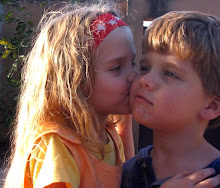Here are some excerpts that I really like from a book called School Proof, by Mary Pride:
What can we give each child that is special?
Recognize children's different learning styles.
Adjust the content of teaching to their roles & talents, &, to a lesser extent, their interests.
Adjust the speed of teaching.
Not penalize children for their legitimate difference, e.g., by grades & labeling.
God gave us four main ways to take in data:
Visual Learners
Are you easily distracted by new sights? Do you remember where you put things? Are you good at catching typos & doing puzzles? Are you very aware of visual details in drawings? Do you remember names better when you see them on a name tag? If you answered "yes" to these questions, you are a visual learner.
Visual learners need to see what they are supposed to do. Some materials that are good for visual learners are:
FLASH CARDS
MATCHING GAMES
PUZZLES
INSTRUCTION BOOKS
CHARTS
PICTURES, POSTERS, WALL STRIPS
Auditory Learners
Do you like to talk a lot? Do you talk to yourself? As a child, were you a "babbler"? Do you remember names easily? /can you carry a tune? Do you like to "keep the beat" along with the music? Do you read out loud or sub-vocalize during reading? Can you follow oral directions more easily than written directions? When taking tests, do you frequently know the answer, but have trouble expressing it on paper? Then you are an auditory learner.
Auditory learners learn best by hearing. They need to be told what to do. Good materials for auditory learners are:
CASSETTE TAPES
EDUCATIONAL SONGS & RHYMES (LIKE THE ABC SONG)
RHYTHM INSTRUMENTS
Tactile/Kinesthetic Learners
Were you always grabbing for things? Did you always run your finger across the boards when walking past a fence? Do you move around a lot & use animated gestures & facial expressions when talking? Can you walk along the curb without losing your balance? Do you prefer hugs from your spouse rather than verbal praise? Do you like to take things apart? Are you always fooling with paper or something on your desk when you're on the phone? If so, then you're a kinesthetic learner.
Hands on learning is a must for kinesthetic learners. Kinesthetic learners learn to read best by learning to write. Kinesthetic learners do not like sitting at a desk for hours staring at the blackboard. For kinesthetic learners, try:
LONG NATURE WALKS
MODEL KITS
YARD WORK & GARDENING
TEXTURED PUZZLES
TYPING INSTEAD OF WRITING (IT'S FASTER & LESS FRUSTRATING)
Manipulative materials & a good phonics program cure reversals in kinesthetic learners, who are the group most frequently labeled "dyslexic."
(end of excerpt)


